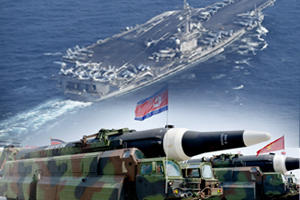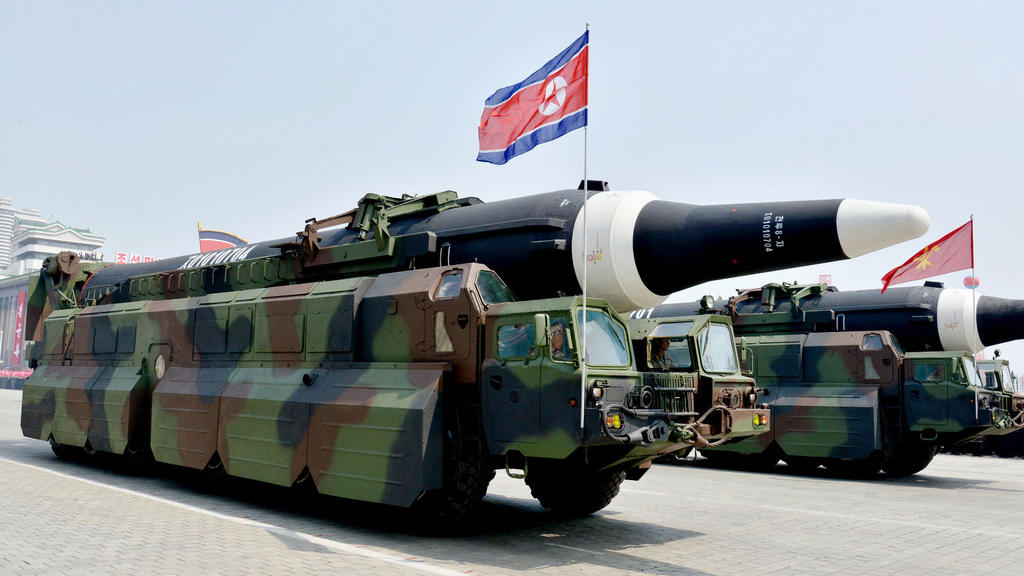
Tensions on the Korean Peninsula are mounting as North Korea continues to conduct missile tests in defiance of U.S. pressure and calls from neighboring countries for further sanctions against the reclusive state. Experts now say that a nuclear-armed North Korea is inevitable, and that the United States may well have to abandon the long-standing goal of denuclearizing the peninsula and shift its focus to halting Pyongyang's missile program to protect American soil.
Japanese media is exaggerating war threat
During a closed round-table session sponsored by The Genron NPO, experts emphasized that the possibility of military conflict with Pyongyang is being exaggerated, particularly in the Japanese media. "The situation has not deteriorated that far when you look at the situation in North and South Korea," one expert said, pointing out that North Korean leader Kim Jong Un was reportedly visiting a pig farm two days before the 85th anniversary of the founding of the Korean People's Army.
The expert further noted that compared to a similar nuclear crisis in 1993, the border has not been closed and foreigners have not been ordered to leave the country. Such moves were taken in 1993, when the International Atomic Energy Agency (IAEA) demanded access to North Korean nuclear waste storage sites suspected of being able to produce weapons-grade plutonium as part of efforts to halt North Korea's nuclear program, to which Pyongyang responded by threatening to quit the Nuclear Non-Proliferation Treaty (NPT).
Readjusting U.S. policy on North Korea
The role of China is typically viewed to be critical in resolving issues with North Korea, but scholars say China is unable to develop an effective strategy to rein in its historical ally. While China has cooperated with other countries in imposing sanctions and has shown rare signs of discontent toward Pyongyang, Beijing would not be able to completely sever relations with its neighbor because of fears that refugees will start flooding into China if the North Korean government collapses, scholars said.
A representative from a private think tank said that if he were to advise the U.S. State Department on how to handle North Korea, he would urge the United States to readjust its policy goal from making North Korea completely abandon its nuclear development program to mitigating the threat by limiting North Korea's actions through soft power and diplomacy. The expert said the United States, Japan, South Korea, China and Russia need to come together to discuss what measures can be taken to ease the North Korean threat. "I think that is the only practical option. Military action won't work, nor will sanctions alone. Sanctions are merely a tool for more effective diplomacy, and no matter how much sanctions are imposed, that will not force North Korea to give up its nuclear program," he said.
But U.S. President Donald Trump does not have the skills to orchestrate such a sustainable multinational approach, and the White House lacks an effective diplomatic team, experts said. There are almost no experienced diplomats in the Trump administration, the type of negotiators who would be indispensable when trying to respond to issues like North Korea where parties with different views need to come together on a united front.
Preventing an ICBM from hitting U.S. soil will become top priority
With years of efforts by the international community to denuclearize the Korean Peninsula making no progress, experts are starting to say that it is too late to have North Korea abandon its nuclear program. A nuclear issue expert suggested that in the next three or four years, Trump may have to acknowledge that North Korea is a nuclear power and watch Pyongyang develop intercontinental ballistic missiles (ICBMs) capable of carrying a nuclear warhead. In that case, the new goal of the United States should be to try to have North Korea freeze its ICBM development program, as the priority will be to avoid any attack on U.S. soil. In order to prevent Pyongyang from completing its ICBM development, participants said the possibility of military action by the United States to stop further North Korean missile tests could not be completely ruled out.
Another approach is to use diplomatic efforts to encourage North Korea to slow its nuclear development by creating an environment where North Korea feels less threatened. What North Korea decides to do would depend on the security environment surrounding the nation, and once the hostile climate eases in the eyes of Pyongyang, it may consider limiting the number of warheads it produces as the government is well aware that a burgeoning defense budget will slow economic development, experts said.
"What is important now is to focus on diplomacy. I am skeptical about the impact of sanctions on promoting such an environment," one participant said. The ultimate goal of such diplomacy is to see North Korea abandon all nuclear weapons, but to have the country freeze its missile development program would be the short-term aim of this diplomatic effort. North Korea has expressed a willingness to consider that, but only on the condition that the security environment improves in its favor.
Another long-term goal would be to have all concerned nations sign a peace treaty, with the first step to have them express a willingness to engage in such negotiations. Japan has long focused on the issue of the abduction of Japanese nationals by North Korea. Hence others see Japan as not seeing the nuclear issue as a top priority. If Japan had focused more on the nuclear issue, then it could have played a key role in the diplomatic process, experts said. They said the best option now is to concentrate on what North Korea wants and to build a consensus as to what would be the best way to achieve that wish. Concerned parties need to participate in realizing this goal, with the United States offering a framework for such a deal. "China may frown upon it, but it is best that the North Korean issue be dealt with first on a bilateral level between the United States and North Korea," said one participant.
North Korea is also hostile to its major ally China
While the general consensus is that China is not as interested as other concerned nations in becoming seriously engaged in resolving the North Korean issue, one needs to note that the situation may not change even if Beijing does make a serious effort to resolve the crisis. One expert shared a conversation he had with a North Korean Army official back in 2001, during which the official confided that North Korea considers China to be a threat for trying to destroy its sovereignty and was willing to wage war with China using its missiles that could easily reach Beijing. China and North Korea are believed to have a relationship forged in the blood of the Korean War, "but in actuality, there is no such sense of affection. So even if China is persuaded by the United States to exert as much pressure as possible, there is no guarantee that will work, and North Korea is unlikely to cease fighting," the expert said.
If the U.S. concedes that North Korea will eventually possess nuclear weapons, questions were raised as to how such a stance will impact the U.S. relationship with allies South Korea and Japan. While it is unlikely that the United States will immediately withdraw its armed forces from East Asia, a survey conducted in South Korea last December showed that a majority of people were willing to see South Korea arm itself with nuclear weapons. Meanwhile, a different survey in Japan showed only 5 percent of people agreeing to nuclear armament, and with the general public against Japan arming itself with nuclear weapons, the only option for Japan is to strengthen and maintain the U.S.-Japan alliance, said Yasushi Kudo, president of The Genron NPO.
Anything is possible under the Trump administration
Participants agreed it was unlikely that the situation on the Korean Peninsula will change dramatically, given how the international community has dealt with similar threats and crises from North Korea for over a decade. But that is based on the premise that North Korea not be needlessly provoked.
Previous U.S. administrations, from Clinton to Obama, were careful not to. The concern now is that Trump may tweet something that rattles Pyongyang into thinking it was a sign the United States was ready to strike. There are also people in Washington who believe that North Korea would not be able to mount a substantial counterattack anyway. If Trump is convinced by such people, there is a slim chance that he may actually try to push Pyongyang into using military force, experts said.
On a more ironic note, the fact that Trump's actions and plans are unpredictable may work better against a reclusive young leader who is equally unpredictable. One day Trump may denounce Kim as an idiot, but then hop on a plane the next day, fly to Pyongyang or Beijing and shake hands with him. "Such drama may actually unfold," one expert mused.

Post a comment